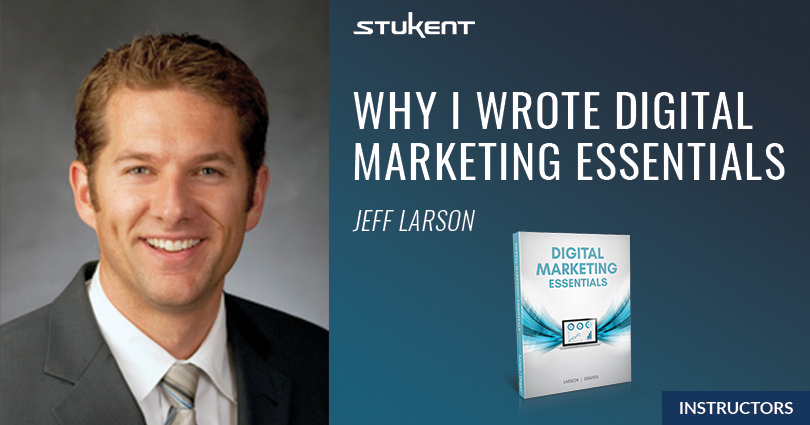The world of a young marketing professor revolves around two things: research and teaching.
As a young marketing professor, I had a limited awareness that some professors choose to write textbooks, but the little I did know led me to a firm conclusion—the last thing I ever wanted to do was write a textbook.
I had been teaching digital marketing at BYU for five years (since Fall 2009), and between online readings and my own lecture materials, I did not believe a textbook would add much value to the course. In addition, I was skeptical that a textbook could keep up-to-date with the ever-changing digital marketing landscape.
When Stukent approached me in the fall of 2013 about writing Digital Marketing Essentials, I had no interest in even using a textbook, let alone writing one, so I was not initially open to the idea.
Instead, I gave feedback about the kind of courseware that might be useful for other professors teaching digital marketing.
About a year later, Stukent again contacted me to tell me they had an AdWords simulation and were still interested in collaborating on a textbook. Over the course of that year, three realizations had changed my mind about writing a textbook, so I decided to embark on the difficult but ultimately rewarding task of writing Digital Marketing Essentials.

The first realization came while I was lecturing to my students during the winter semester of 2014: it struck me that I was artificially limiting my students’ learning.
By coming to class with no knowledge on the topic of the day, I used the majority of class time explaining the particulars of the marketing tactic. A much more efficient use of time would be to have students read the material before class and use class time to build on that knowledge through exercises and additional discussion.
If a textbook could succinctly provide information about each digital marketing tactic, class time could be used to generate additional knowledge and skills so that students could come away from my class with a much richer understanding and skillset for digital marketing.
A second factor that led me to write Digital Marketing Essentials was the online format of the textbook.
By hosting the textbook online rather than selling printed copies, the textbook can be kept up to date so students and professors never have to worry whether they are reading misleading or out-of-date information.
Since the first version of the textbook was released in the summer of 2015, we have made 7 major updates in addition to dozens of minor updates of technical details associated with various digital marketing channels and platforms.
Finally, the opportunity to help professors all over the world provide first-rate instruction in digital marketing was too attractive to pass up.
Putting together a course on digital marketing was daunting for me in 2009, and it is no less daunting in 2018. Learning the specifics of various digital marketing tactics like search engine optimization and retargeting is daunting enough, but even learning of the existence of the many digital marketing tactics can by itself be overwhelming.
Our goal in writing the textbook and the instructor support materials was to enable any marketing professor to teach digital marketing effectively from his or her very first semester.

 We continually update both the textbook and the support materials to increasingly make this goal a reality. This includes a major overhaul of the lecture slides in the Fall of 2018 and an upcoming update to the lesson plans.
We continually update both the textbook and the support materials to increasingly make this goal a reality. This includes a major overhaul of the lecture slides in the Fall of 2018 and an upcoming update to the lesson plans.
It is gratifying to know that our textbook is enabling thousands of students to gain employable skills that they might not otherwise have an opportunity to gain.
– Jeff Larson
Professor of Marketing, Brigham Young University
[vc_row_inner inner_container=”true” no_margin=”true” padding_top=”0px” padding_bottom=”30px” border=”none”][vc_column_inner fade_animation_offset=”45px” width=”1/1″][x_video_embed type=”16:9″] [/x_video_embed][/vc_column_inner][/vc_row_inner]
About the Author
Jeff Larson – Larson is a professor of marketing at Brigham Young University, where he has taught courses in Marketing Research and Internet Marketing since 2007. He received a Master’s Degree in Applied Economics and a Ph.D. in Marketing from the University of Pennsylvania, Wharton School of Business.
Many of the students who have taken Jeff’s Internet Marketing course now work for top tech companies, including Google, Amazon, Pinterest, Adobe, Qualtrics, and Domo. His research examines contextual influences in consumer behavior and decision making, combining skills in psychology-based experiments and advanced data-analysis techniques.






